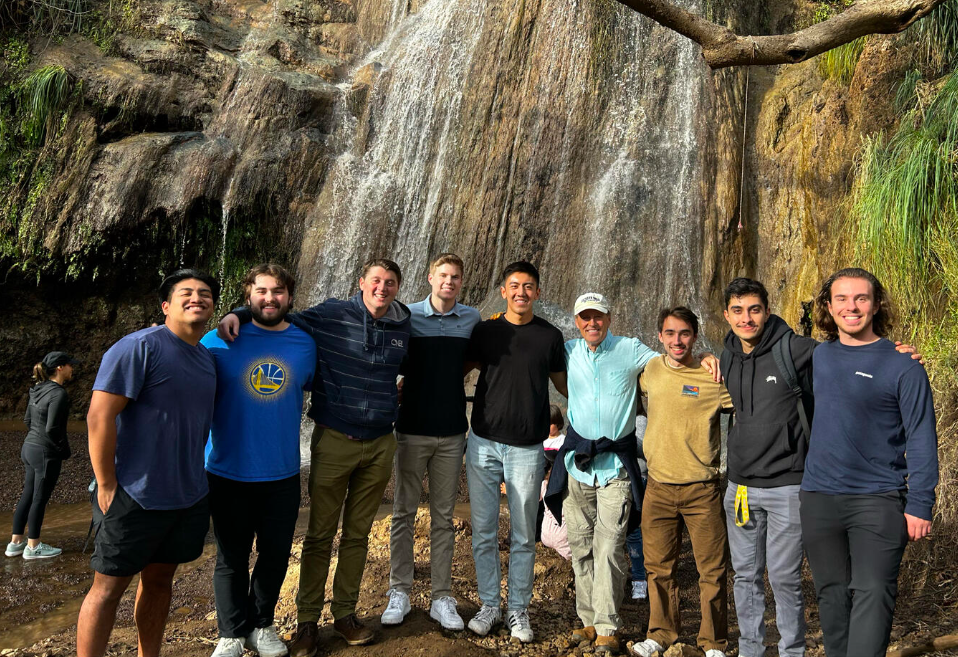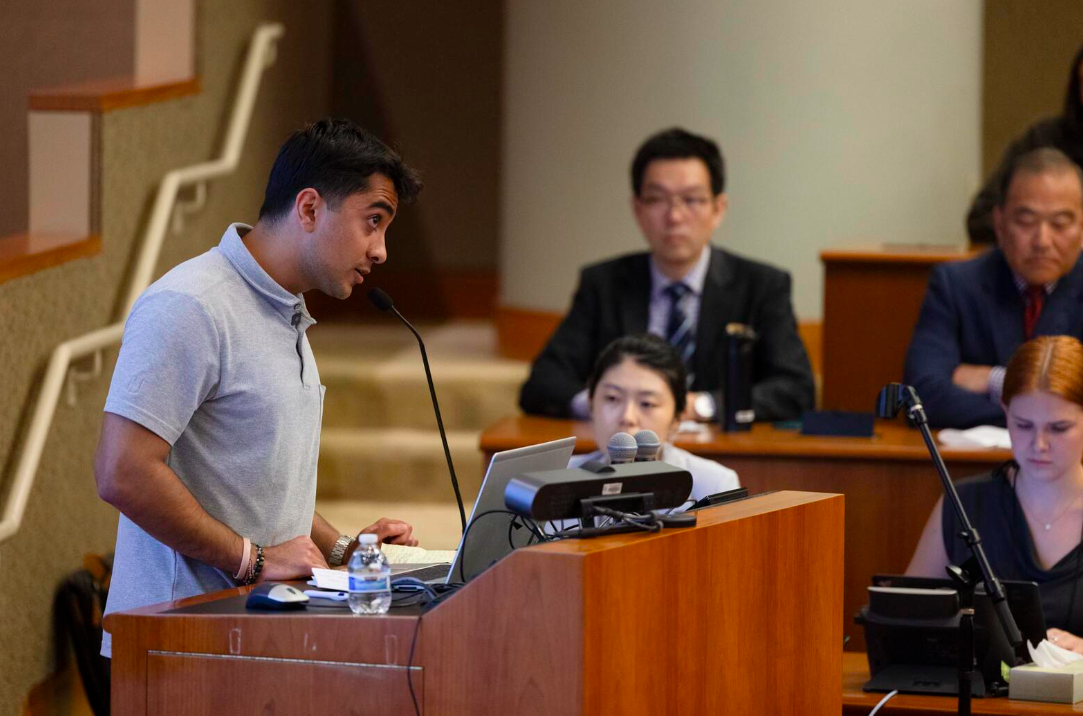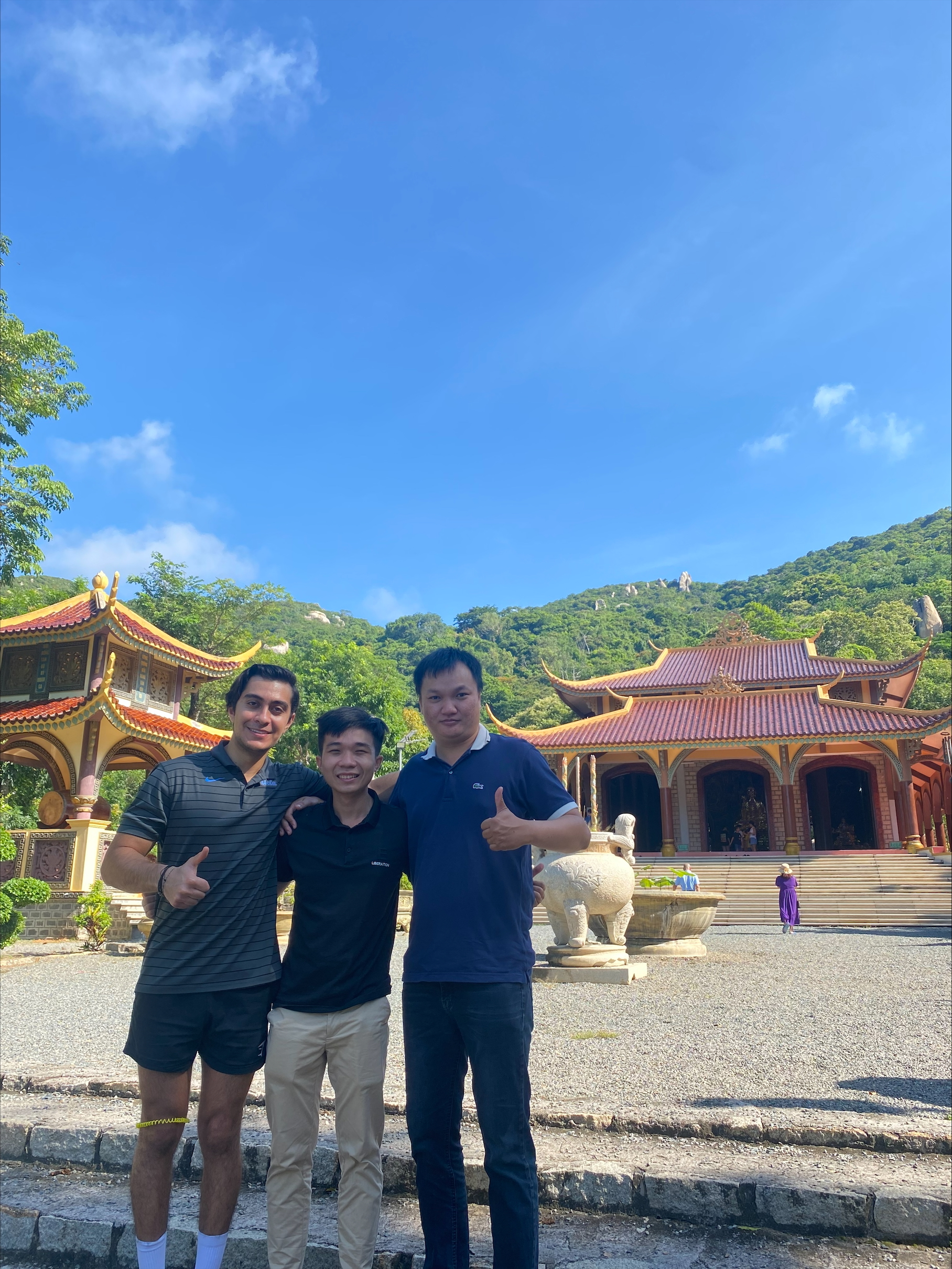Capitalizing on My Time in the Nation’s Capital
Sam Rafizad August 5, 2025
My interest in international relations and foreign policy developed in 2018 when the U.S.
withdrew from the Joint Comprehensive Plan of Action (JCPOA), commonly referred to as the
Iran nuclear deal. Seeing the human consequences of economic sanctions in Iran sparked not
only an awareness of the widespread impact that our foreign policy decisions have on civilian
populations but also a passion for thinking through solutions to international peace and security
challenges. As I pursued my interest in U.S.-Iran relations at the University of California, Los
Angeles (UCLA), my intellectual appetite continued to grow. I wanted to know that I was
applying my interests towards more than just a letter grade—I wanted to apply the knowledge I
was gaining in the classroom to real-world settings through practical work and hands-on
experience. I knew that real impact was made in Washington, DC, but, being 2,678 miles away,
the idea of working on Iran issues in the Nation’s capital seemed like a pipe dream.

That is, until I came across the Herbert Scoville Jr. Peace Fellowship. The fellowship revealed a
potential pathway to bring my unique perspective and knowledge of Iran policy issues to the DC
policy world. It also presented me with the opportunity to work on non-proliferation issues and
gain experience and leadership skills in this field. This pathway became even more realistic
when I realized that I was the type of applicant the fellowship was looking for: a recent graduate
with a strong interest in international peace and security issues but no substantial prior
experience in the nonprofit advocacy and research sector.
Fast forward nine months after my fortuitous Google Search, and it still feels surreal that I am contributing to research and analysis for the Middle East Nonproliferation Program at the James Martin Center for Nonproliferation Studies, the largest non-governmental organization in the U.S. devoted exclusively to research and training on weapons of mass destruction.

The Scoville Fellowship has offered me the opportunity to simultaneously explore my interests and career ambitions while immersing myself in the heart of American politics and foreign policymaking. In California, I was surrounded by surfers and beachgoers who were unperturbed by the crisis taking place outside their coastal bubble. In Washington, I am surrounded by policy experts and practitioners who are committed to finding practical solutions to such crises. The fellowship has opened doors I never imagined were accessible and even revealed opportunities I did not know existed. That being said, there are three opportunities that have been the most important to me.
First and foremost, the Scoville Fellowship has enabled me to professionally engage with my
longtime intellectual interests. Through my research for the James Martin Center for
Nonproliferation Studies’ Middle East Nonproliferation Program, I have focused on bridging the
knowledge gap that exists in U.S. policymakers’ political, cultural, and historical understanding
of Iran. In policy, such misunderstandings run the risk of producing undesirable consequences;
and in the Iran case, they have led to worsening U.S.-Iran relations. At CNS, I have made a
small, though not insignificant, contribution towards remedying this problem. Though I am still
working with the same open-source research that I used at UCLA, it is extremely gratifying to
know that my research and analysis are contributing towards better-informed policy on Iran.
My favorite experience at CNS thus far has been participating in our Iran roundtable discussion. The
workshop convened 40 government and non-government Iran experts to provide feedback and
analysis for our project on Iran’s deterrence strategy. I could not help but feel starstruck by not
just the sheer amount of experience and expertise in the room, but also the environment that I
was in. One year ago, I was debating U.S. policy on Iran with college classmates while the
debates with real implications were taking place in a room on the other side of the country.
Because of the Scoville Fellowship, I am now sitting in that room and making my voice heard,
advocating for innovative, diplomatic solutions to regional issues. During the breaks, I sought
out these esteemed attendees, like the former Director for Iran at the National Security Council,
Richard Nephew, to introduce myself and discuss my research. While discussing U.S. policy on
Iran over lunch was a typical day in the office for these experts, it was extremely meaningful to
me given where I was just a year ago.

The fellowship has also provided me with invaluable professional development opportunities. In
California, I was so far away from policy workshops and conferences that I could not acquire the
additional knowledge and skills on foreign policy issues that such learning and networking
opportunities offer. However, in DC I have attended numerous public events, ranging from panel
discussions on quantum mechanics to Congressional committee hearings on the “Axis of
Autocracy.” Besides my primary research focus on Iran, I am also fascinated with space law and
security (I am currently reading War in Space: Strategy, Spacepower, Capabilities), so I have
sought opportunities to develop professional skills in this topic, as well. I have attended events
such as the International Institute of Strategic Studies panel on the “Future of Space Policy” to
network and learn from professionals working on space policy. At this event, panelist Dr. Bruno
Reynaud de Sousa, a space law expert, was incredibly helpful in guiding me towards resources
that would allow me to begin developing an expertise in my secondary interest. Networking and
learning from professionals at public events has been incredibly rewarding, as these career
development opportunities have provided access to insights I would not have otherwise had.
The most memorable conference that I attended through the Scoville Fellowship was the
Carnegie Nuclear Policy Conference, a.k.a., “NukeCon.” It was like an auto show, but for
nuclear policy. Over the course of three jam-packed days of panels, I listened to experts speak on
a variety of topics, including a keynote conversation with the International Atomic Energy
Agency Director General Rafael Grossi—the non-proliferation community’s A-list celebrity.
Here, I also had the special privilege of meeting Dr. Ali Vaez, the Iran Project Director with the
International Crisis Group, after his panel on the prospects for diplomatic negotiations with Iran.
Ali was the first Iran expert whose writing I read and someone I have always admired, given his
even-keeled analytical approach. In high school, I never would have imagined that I would be
able to meet Ali multiple times, exchange ideas, and develop a personal relationship with one of
my inspirations in this field, but the Scoville Fellowship made this possible.

Finally, I am especially grateful for the mentorship opportunities provided by the Fellowship. At UCLA, I lacked mentors to guide me as I searched for opportunities during and after college. Even the professor and teaching assistant for my Arms Control and International Security course, which revolved around nuclear politics, were unaware of internship and job opportunities in this field. As a Scoville Fellow, I no longer have that problem. With Kelsey Davenport, Director for Nonproliferation Policy at the Arms Control Association, as my mentor, I have an incredibly knowledgeable and well-connected adviser to help me navigate the early stages of my career. Moreover, I quickly forgot about the dearth of mentors during my undergraduate education once I gained access to Scoville’s huge alumni network, which continues to grow after 38 years(!!). It has been fascinating to speak with individuals who were once in my shoes and are now established professionals in their respective fields. Learning from their experiences and how they leveraged the Fellowship to achieve their professional aspirations has been incredibly valuable in informing how I can achieve my career goals.
A year ago, I never would have believed that I would be a member of the peace and security
community, working on Iranian nuclear issues and sharing my views with distinguished policy
experts. Nevertheless, the Scoville Fellowship brought me—a California kid interested in
U.S.-Iran relations but doubtful he would be able to pursue this interest professionally—2,678 miles across the country to help me realize my dream of improving U.S.-Iran relations. The personal and professional growth that I have experienced in the last six months are immeasurable, but the memories and lessons are everlasting.

Sam Rafizad is a Spring 2025 Scoville Fellow with the James Martin Center for Nonproliferation Studies.
